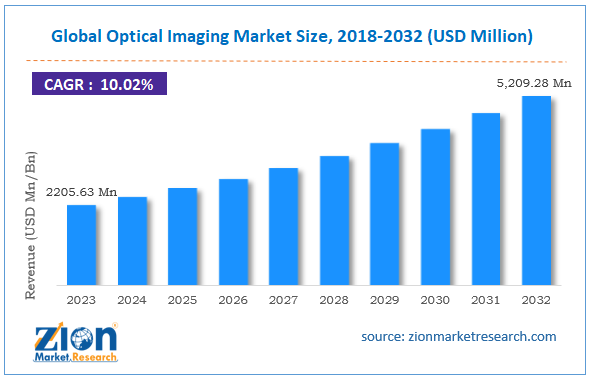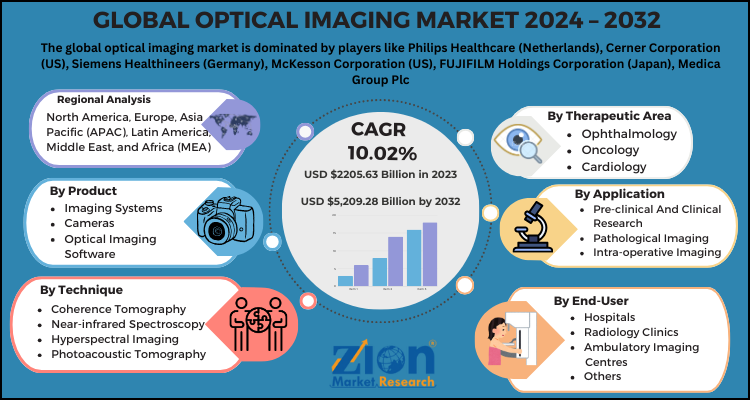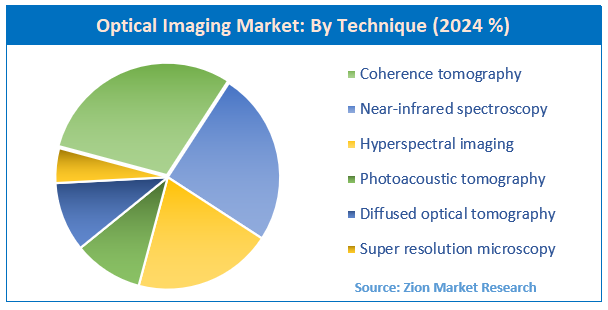Optical Imaging Market Trend, Share, Growth, Size and Forecast 2032

Optical Imaging Market By Technique (Optical Coherence Tomography, Near-Infrared Spectroscopy, Hyperspectral Imaging, Photoacoustic Tomography, Diffused Optical Tomography, Super Resolution Microscopy), By Therapeutic Area (Ophthalmology, Oncology, Cardiology, Dermatology, Neurology, Dentistry, Others), By Application (Pre-Clinical and Clinical Research, Pathological Imaging, Intra-Operative Imaging), By End-User (Hospitals and Clinics, Research Laboratories, Pharmaceutical and Biotechnology Companies, Diagnostic Imaging Centres), By Product (Imaging Systems, Cameras, Optical Imaging Software, Illumination Systems, Lenses, Other Optical Imaging Products), and By Region: Global Industry Analysis, Size, Share, Growth, Trends, and Forecasts 2024-2032
| Market Size in 2023 | Market Forecast in 2032 | CAGR (in %) | Base Year |
|---|---|---|---|
| USD 2205.63 million | USD 5,209.28 million | 10.02% | 2023 |
Description
The global Optical Imaging market size accrued earnings worth approximately USD 2205.63 Million in 2023 and is predicted to gain revenue of about USD 5,209.28 Million by 2032, is set to record a CAGR of nearly 10.02% over the period from 2024 to 2032
Key Insights:
- As per the analysis shared by our research analyst, the optical imaging market is anticipated to grow at a CAGR of 10.2% during the forecast period (2024-2032).
- The global optical imaging market was estimated to be worth approximately USD 2205.63 million in 2023 and is projected to reach a value of USD 5,209.28 million by 2032.
- The growth of the optical imaging market is being driven by expanding applications in healthcare, life sciences, and industrial sectors.
- Based on the product, the imaging systems segment is growing at a high rate and is projected to dominate the market.
- On the basis of technique, the coherence tomography segment is projected to swipe the largest market share.
- In terms of therapeutic area, the ophthalmology segment is expected to dominate the market.
- Based on the application, the pre-clinical segment is expected to dominate the market.
- On the basis of end user, the hospitals segment is projected to swipe the largest market share.
- By region, North America is expected to dominate the global market during the forecast period.
Global Optical Imaging Market: Overview
A medical technique which is used for obtaining detailed images of organs, molecules, cells, tissues and others in the presence of visible light is known as optical imaging. It is an emerging technology which has great potential to enhance the mode of treatment, disease prevention, and diagnosis in the hospital operating room. It offers a number of advantages over radiological imaging techniques. Optical imaging technique uses non-ionizing radiation; it reduces the patient’s radiation exposure thus allowing for frequent studies over time. It has the ability to differentiate soft tissues from the native soft tissues or the tissues labeled with either exogenous or endogenous contrast media with the help of different photon absorption profiles at diverse wavelengths. Scattering differences and photon absorption provides specific tissue contrasts and potential capabilities in order to study functional and molecular level activities. Optical imaging is multimodal and a very responsive imaging technique that can be easily combined with other imaging techniques.
Recent Development
- In March 2025, Gleamer acquired Pixyl and Caerus Medical, strengthening its AI medical imaging portfolio with MRI technology. The move aligns with the industry trend of integrating AI across imaging modalities to improve diagnostic accuracy, efficiency, and clinical workflows.
- In October 2024, a St. John’s faculty member received a $745,000 NIH grant to improve image-guided brain tumor surgeries. The project focuses on developing nano-based optical imaging agents and assessing their potential for brain imaging.
- In October 2024, BeeKeeperAI, Inc. partnered with Topcon Healthcare, Inc. to improve the detection and management of eye diseases by integrating Topcon’s digital health platform with BeeKeeperAI’s EscrowAI software for streamlined analysis of eye imaging data.
- In February 2024, Philips introduced LumiGuide, an imaging technology that allows doctors to navigate blood vessels using light rather than X-rays.
Optical Imaging Market: Report Scope
| Report Attributes | Report Details |
|---|---|
| Report Name | Optical Imaging Market |
| Market Size in 2023 | USD 2205.63 Billion |
| Market Forecast in 2032 | USD 5,209.28 Billion |
| Growth Rate | CAGR of 10.02% |
| Number of Pages | 204 |
| Key Companies Covered | Philips Healthcare (Netherlands), Cerner Corporation (US), Siemens Healthineers (Germany), McKesson Corporation (US), FUJIFILM Holdings Corporation (Japan), Medica Group Plc. (UK), Agfa Healthcare (Belgium), Mirada Medical (US), ONRAD Inc. (US), RamSoft Inc. (Canada), NovaRad Corporation (US), TeleDiagnostic Solutions Pvt. Ltd. (India), Teleradiology Solutions (India), Telerad Tech (India), StatRad LLC (US), MedWeb LLC (US), WebRad TeleRadiology (India), Nautilus Medical (US), 4ways Healthcare (UK), USARAD Holdings, Inc. (US), GE Healthcare (US). |
| Segments Covered | By Product, By Technique, By Therapeutic area, By Application, By End User, and By Region |
| Regions Covered | North America, Europe, Asia Pacific (APAC), Latin America, Middle East, and Africa (MEA) |
| Base Year | 2023 |
| Historical Year | 2018 to 2022 |
| Forecast Year | 2024 - 2032 |
| Customization Scope | Avail customized purchase options to meet your exact research needs. Request For Customization |
Global Optical Imaging Market: Growth Factors
Pharmaceutical and biomedical industries are highly demanding radiation free imaging techniques thus increasing the demand for optical imaging. Increasing prevalence of neurological and ophthalmological disorders among the population may foster the demand of imaging diagnosis which in turn will propel the market growth. Technological advancement and rise in government support for development in the healthcare sector open up new growth opportunities. Others key factors that drive the global market are faster adoption rates of technically advanced devices, well-developed research infrastructure, and availability of skilled professionals. Advancement in the technology has completely transformed the medical science to a large extent and optical imaging is one among them which has revolutionized the healthcare sector by effective diseases detection potential. However, harsh government regulations and a huge capital requirement for installation of the optical imaging have hampered the market growth to some extent.
Global Optical Imaging Market: Segmentation
The global optical imaging market is fragmented based on product, therapeutic area, and technique.
The product segment is classified as retinal cameras, mydriatic and non-mydriatic imaging systems, slit lamp imaging systems, and software.
The Therapeutic Area is segmented into neurology, oncology, dermatology, and ophthalmology.
Furthermore, the Technique Segment includes diffuse optical tomography, terahertz tomography, optical coherence tomography, photoacoustic imaging, and endoscopy.
Optical Imaging Market Dynamics
Key Growth Drivers
The Optical Imaging Market is experiencing significant growth, primarily driven by the rising global prevalence of chronic diseases such as cancer, diabetes, and cardiovascular conditions. These diseases necessitate early and accurate diagnosis, for which optical imaging techniques offer a safe and effective solution. The market is also propelled by the increasing demand for non-invasive and radiation-free diagnostic methods, as consumers and healthcare providers seek alternatives to traditional imaging modalities like X-rays and CT scans. Furthermore, ongoing technological advancements in imaging sensors, optics, and computational power are enhancing the capabilities of optical imaging systems, leading to higher resolution, improved speed, and expanded applications in various medical fields like ophthalmology and dermatology.
Restraints
Despite the robust growth, the Optical Imaging Market faces several significant restraints. A major challenge is the limited ability to image deep tissues. Optical light scatters easily in biological tissues, which restricts the effectiveness of current optical imaging techniques to superficial or surface-level imaging of organs like the skin, eyes, and mucosal cavities. While new techniques like photoacoustic imaging are being developed, they have not yet achieved widespread clinical adoption. Another key restraint is the high cost of advanced optical imaging systems and the limited or inadequate reimbursement policies for certain procedures. This can make it difficult for healthcare providers, particularly in developing regions, to justify the substantial investment in these technologies.
Opportunities
The Optical Imaging Market is ripe with opportunities, especially through technological innovation and market expansion. The integration of Artificial Intelligence (AI) and Machine Learning (ML) is a key opportunity, as these technologies can automate image analysis, enhance diagnostic accuracy, and streamline clinical workflows, thereby improving efficiency and patient outcomes. The growing demand for portable and miniaturized devices for point-of-care diagnostics presents a significant opportunity to make optical imaging more accessible in a variety of settings, from clinics to remote areas. Additionally, the expansion of the market into emerging economies, where healthcare infrastructure is rapidly developing and the prevalence of chronic diseases is on the rise, offers a vast and untapped market for manufacturers.
Challenges
The Optical Imaging Market faces several complex challenges. A major challenge is the technical complexity of the systems, which requires a highly skilled workforce for operation and interpretation, leading to a shortage of qualified professionals. The fragmentation of the market with numerous players and a lack of standardized products can make it difficult for buyers to choose the right solution and ensure interoperability with existing systems. Furthermore, the industry must contend with ethical considerations and regulatory hurdles, as the development and deployment of new optical imaging devices for clinical use require rigorous testing and compliance with stringent government regulations to ensure patient safety and data privacy.
Global Optical Imaging Market: Regional Analysis
North America is the one of the most prominent region that is highly investing in the healthcare sector which is the key factor that is driving the global optical imaging market growth. Rapid growth in the aging population in countries such as U.K., Spain, Italy, Germany, and others is expected to boost the global market growth. Asia-Pacific region anticipates witnessing growth in the future owing to factors such as exponential growth in the population, rise in the per capita income, and developing healthcare. Impacting Research Innovation and Technology (IMPRINT) is the initiative taken by the Indian government to promote research and development in imaging and other technology sectors.
Global Optical Imaging Market: Competitive Players
Major players in the global optical imaging market include
- Philips Healthcare (Netherlands)
- Cerner Corporation (US)
- Siemens Healthineers (Germany)
- McKesson Corporation (US)
- FUJIFILM Holdings Corporation (Japan)
- Medica Group Plc. (UK)
- Agfa Healthcare (Belgium)
- Mirada Medical (US)
- ONRAD Inc. (US)
- RamSoft Inc. (Canada)
- NovaRad Corporation (US)
- TeleDiagnostic Solutions Pvt. Ltd. (India)
- Teleradiology Solutions (India)
- Telerad Tech (India)
- StatRad LLC (US)
- MedWeb LLC (US)
- WebRad TeleRadiology (India)
- Nautilus Medical (US)
- 4ways Healthcare (UK)
- USARAD Holdings, Inc. (US)
- GE Healthcare (US).
Global Optical Imaging Market: Segment Analysis
By Product
- Imaging systems
- Cameras
- Optical imaging software
- Illumination systems
- Lenses
- Other optical imaging products
By Technique
- Coherence tomography
- Near-infrared spectroscopy
- Hyperspectral imaging
- Photoacoustic tomography
- Diffused optical tomography
- Super resolution microscopy
By Therapeutic area
- Ophthalmology
- Oncology
- Cardiology
- Dermatology
- Neurology
- Dentistry
- Others
By Application
- Pre-clinical and clinical research
- Pathological imaging
- Intra-operative imaging
By End User
- Hospitals
- Radiology clinics
- Ambulatory imaging centres
- Others
By Region
- North America
- U.S.
- Europe
- UK
- France
- Germany
- Asia Pacific
- China
- Japan
- India
- Latin America
- Brazil
- The Middle East and Africa
What Report Provides
- Full in-depth analysis of the parent market
- Important changes in market dynamics
- Segmentation details of the market
- Former, on-going, and projected market analysis in terms of volume and value
- Assessment of niche industry developments
- Market share analysis
- Key strategies of major players
- Emerging segments and regional markets
- Testimonials to companies in order to fortify their foothold in the market.
Table Of Content
FrequentlyAsked Questions
Based on statistics from the Zion Market Research, the global Optical Imaging Market size was projected at approximately US$ 2205.63 Billion in 2023. Projections indicate that the market is expected to reach around US$ 5,209.28 Billion in revenue by 2032.
The global Optical Imaging Market is expected to grow at a Compound Annual Growth Rate (CAGR) of around 10.02% during the forecast period from 2024 to 2032.
North America is expected to dominate the global Optical Imaging Market.
The global Optical Imaging Market is driven by several key factors such as; rising demand for fresh and organic produce, population growth, and health-conscious consumer preferences.
Some of the prominent players operating in the global Optical Imaging Market are; Philips Healthcare (Netherlands), Cerner Corporation (US), Siemens Healthineers (Germany), McKesson Corporation (US), FUJIFILM Holdings Corporation (Japan), Medica Group Plc. (UK), Agfa Healthcare (Belgium), Mirada Medical (US), ONRAD Inc. (US), RamSoft Inc. (Canada), NovaRad Corporation (US), TeleDiagnostic Solutions Pvt. Ltd. (India), Teleradiology Solutions (India), Telerad Tech (India), StatRad LLC (US), MedWeb LLC (US), WebRad TeleRadiology (India), Nautilus Medical (US), 4ways Healthcare (UK), USARAD Holdings, Inc. (US), GE Healthcare (US).
The global Optical Imaging Market report provides a comprehensive analysis of market definitions, growth factors, opportunities, challenges, geographic trends, and competitive dynamics.
HappyClients
Zion Market Research
Tel: +1 (302) 444-0166
USA/Canada Toll Free No.+1 (855) 465-4651
3rd Floor,
Mrunal Paradise, Opp Maharaja Hotel,
Pimple Gurav, Pune 411061,
Maharashtra, India
Phone No +91 7768 006 007, +91 7768 006 008
US OFFICE NO +1 (302) 444-0166
US/CAN TOLL FREE +1 (855) 465-4651
Email: sales@zionmarketresearch.com
We have secured system to process your transaction.
Our support available to help you 24 hours a day, five days a week.
Monday - Friday: 9AM - 6PM
Saturday - Sunday: Closed







